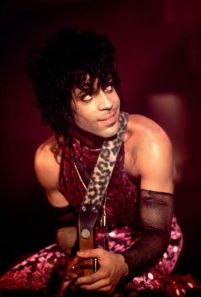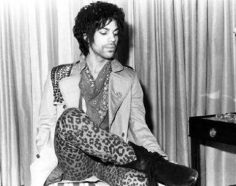by Shane Thomas Follow @tokenbg
The first thing that struck me about Prince was his voice. Not his singing voice – as marvellous as that was – but his speaking voice. It’s measured. It’s calm. Mellow without ever being monotone. You know who it reminds me of? Toni Morrison. It’s the vocal signature of someone who is totally confident and secure in themselves.
We should also remember what a good dancer he was. Beyond the sumptuous outfits, ornate stage design, and guitar skills that are arguably unmatched, Prince could move. Even if he’d never played an instrument, he would still have been one of the greatest ever live performers.
I’m sure I’m not alone in spending the past few days enveloped in the comforting cocoon of Prince’s songs. I’m sure I’m not alone in reading about 1,999 thinkpieces on his passing. And maybe I’m not alone in viewing Prince as the all-time of all-time. He was my favourite musician, the one whose art nourished, delighted, and uplifted me like no other.
That said, I didn’t engage with Prince’s work until my late teens. Rembert Browne observed that “Prince stripped us down to our core his entire career”. This sat uneasily with the isolated, insecure kid in Streatham who saw this short, scrawny guy from Minneapolis as an exemplar of everything a man shouldn’t be.
I now understand this was a problem of my own making, as I was also (and still am) short and scrawny, but unlike His Royal Badness, I desperately wanted to avoid anything that wouldn’t denote me as “a man”. Mercifully, Prince’s music shattered the patriarchal panes of glass I’d constructed around myself. Brian Phillips describes the effects of music thus: “When a song hits you the right way, it doesn’t feel analytically finite. Maybe that’s just brain chemistry, I don’t know. It feels like a miracle.”
The pulsing chimera of his songs compelled me to see the world through a wider and more fluid prism. The music had (and has) an urgency that was as elemental as it was beautiful, with an emotion that was totally unvarnished. Prince didn’t change who I was, but rather helped me come to terms with who I already was. His art had a place for all different types of personalities, including my own[1].
 That’s why his liquefaction of the straight lines of gender presentation was so important. It never felt like a gimmick. The stockings, the heels, the make-up; this wasn’t an infant playing dress-up. They were part of the mien that made Prince Rogers Nelson who he was. You couldn’t have his guitar solos without the attire that busted gender binaries.
That’s why his liquefaction of the straight lines of gender presentation was so important. It never felt like a gimmick. The stockings, the heels, the make-up; this wasn’t an infant playing dress-up. They were part of the mien that made Prince Rogers Nelson who he was. You couldn’t have his guitar solos without the attire that busted gender binaries.
A lot of this occurred in Ronald Reagan’s America. A time when the nation’s pop-culture was all about “family values” and “hard-bodied” masculine heroes, symbolised by Sylvester Stallone and Arnold Schwarzenegger – hardly the most amenable surroundings for an undersized black kid trying to find their way.
Prince was often described as audacious, but audacity is only perceptible when so much around it is vapid. A better word to describe him might be courageous, because it must have taken immeasurable courage to wholly be yourself in such environs. Prince wasn’t just brilliant. Prince was brave.
And then there’s the sex. Carnal Prince was always my favourite Prince. Half the fun of songs like Peach, Ripopgodazippa, or Cindy C. are the ad-libs in between the lyrics. The “Hold on… is that… are they… no, they can’t be” moments, before second-guessing yourself because, “I mean, it is Prince. That could actually be the real thing.”
But while sex was a repeated feature of his oeuvre, did anyone subvert sex like Prince? It wasn’t a cudgel for him to assert his dominance, or to cultivate an image of cis male superiority. He could seamlessly oscillate between rakish and guileless, and wasn’t above being the conduit for a woman to have her fun. Far too often, we’re conditioned to think of sex as a sport that must have a winner and a loser. But under Prince’s aegis, it had no kyriarchal structures. Sex was alchemised into something both pure and brazen.
Despite his supernatural gifts, Prince’s work ethic was second-to-none. His dedication was of a man thirsting for musical excellence. But this wasn’t motivated by the aphorism of “twice as good for half as much” that black people are achingly familiar with. This was excellence for its own sake, a person so in thrall to the power of music, that to try and be anything less than excellent would have been the highest sign of disrespect.
T his assiduity extended to every facet of Prince’s career. Some felt his esurient need to exercise absolute control over his narrative was nothing more than egotism. But Prince was never a short-sighted man, and you have to place his decisions – even if you disagree with them – in the historical context of black people’s artistic labour, which sometimes made them rich, but always made white men wealthy.
his assiduity extended to every facet of Prince’s career. Some felt his esurient need to exercise absolute control over his narrative was nothing more than egotism. But Prince was never a short-sighted man, and you have to place his decisions – even if you disagree with them – in the historical context of black people’s artistic labour, which sometimes made them rich, but always made white men wealthy.
It’s a history that includes legends like Marvin Gaye and Gil Scott-Heron. Black men who achieved greatness, but also suffered hugely, never being able to attain personal freedom.
That’s what made Prince so extraordinary. Because more than anything, he felt to me like an oasis of liberation in a world wedded to anti-blackness, distilled into one Dionysian, diminutive, electric genius – the emancipated musical offspring of Memphis Minnie, Sly Stone, Ma Rainey, and Little Richard.
Isn’t this what social justice is for? To have the complete freedom to be ourselves, unabridged. To have every quirk, every eccentricity, every foible be accepted and celebrated.
You could listen to Prince and feel like you could do or be anything. Because it felt like Prince could do or be anything. We shouldn’t ignore that he had the privileges of being straight, cis, male, and light-skinned, but it’s no less remarkable that Prince found a way to express the full gamut of his humanity in a body that has never been seen as fully human.
He was beloved by many, but had a special place in the hearts of black people. Because in among the sound, style, and sex, he was unapologetically himself: black liberation made flesh.
[1] – I never realised how much until I saw him live for the only time in 2007. This isn’t the best forum to tell that story, but tweet me if you especially want to hear it. It’s a pretty good anecdote.
All work published on Media Diversified is the intellectual property of its writers. Please do not reproduce, republish or repost any content from this site without express written permission from Media Diversified. For further information, please see our reposting guidelines.
“Two Weeks Notice” is Shane Thomas’s bi-monthly column encompassing “Pop culture to sport, and back again“ Shortlisted for EI Arts, Culture and Entertainment commentator of the year
Shane can be found on Twitter, both at @TGEISH and @tokenbg (and yes, the handle does mean what you think it means).
If you enjoyed reading this article, help us continue to provide more! Media Diversified is 100% reader-funded – you can subscribe for as little as £5 per month here
